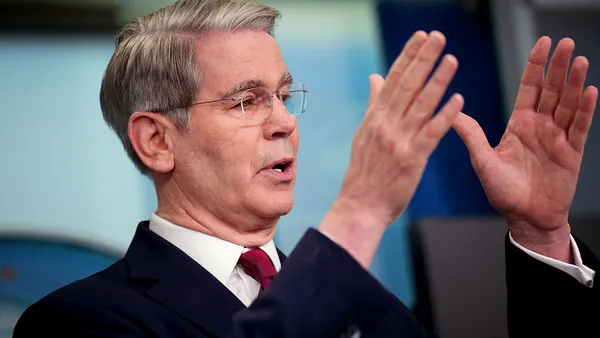Dive Brief:
- The Biden administration issued an executive order Thursday giving Treasury Secretary Janet Yellen six months to recommend steps to reduce the risks to financial stability posed by climate change. Her assessment will incorporate financial regulators’ plans to boost climate-risk disclosures.
- The order also asks National Economic Council Director Brian Deese and National Climate Adviser Gina McCarthy, in coordination with Yellen and the Office of Management and Budget, to identify and disclose, within 120 days, the extent of exposure government programs and assets have to climate risks.
- "Our modern financial system was built on the assumption that the climate was stable, and that assumption has largely dominated existing financial models, and it’s underpinned the way that we invest capital, the way that we have built society, and the way that we have forecasted for the long term," Deese said Thursday, according to Bloomberg. "Today it’s clear that we no longer live in such a world."
Dive Insight:
Biden’s executive order dovetails into the administration’s pledge to cut greenhouse-gas emissions by 50% over the next nine years, in comparison to 2005 levels.
The move comes less than two months after Yellen convened the Financial Stability Oversight Council (FSOC), which brought together the leaders of several regulators. It’s in this capacity, as FSOC chief, that Yellen can ostensibly align regulators’ feedback and effort toward the White House’s aim.
At the FSOC’s late-March meeting, Yellen announced she is establishing a "climate hub" at the Treasury Department centered on "the opportunities of climate finance to support the economy's transition to net-zero" carbon emissions.
"We cannot only look back and learn the lessons of last year. We must also look ahead, at emerging risks. Climate change is obviously the big one," she said.
However, Biden’s order, in itself, is limited in its impact. The order asks Yellen to engage with regulatory agencies "to consider" actions to counteract climate change. That language reflects the executive branch’s lack of direct authority over regulators, David Arkush, climate program director at Public Citizen, told Bloomberg.
"This order goes up to the limit of what they can do," Arkush said.
McCarthy stressed the FSOC’s independence while emphasizing that progress in fighting climate change would be on the agenda regardless.
Several of the regulators who make up the FSOC have taken steps independently to sync on the climate-change fight. The Federal Reserve has devoted two panels to studying and managing its risks and has joined the Network for Greening the Financial System (NGFS).
Rostin Behnam last year convened a Commodity Futures Trading Commission (CFTC) climate risk subcommittee that suggested forcing businesses to pay for their greenhouse-gas emissions. Now he’s the regulator’s acting chief.
Many of the banks several FSOC members oversee have found it in their best interest to cut back on climate risk exposure, too. All six of the largest U.S. banks have pledged to achieve net-zero greenhouse-gas emissions among their financing activities by 2050 — aligning themselves with the 2015 Paris climate agreement to which Biden recommitted the nation after former President Donald Trump withdrew.
In addition, the three largest — JPMorgan Chase, Bank of America and Citi — have pledged to deploy $1 trillion or more each by 2030 to accelerate the transition toward a low-carbon, sustainable future. And Morgan Stanley, Bank of America and Citi joined the Partnership for Carbon Accounting Financials, a consortium that intends to standardize the way banks measure and reduce their climate impact.
The order can also be seen as an action to jump-start U.S. finance sector into keeping up with its European cohorts.
"This global shift presents generational opportunities to enhance U.S. competitiveness and economic growth, while also creating well-paying job opportunities for workers," Biden wrote in the order.
Deutsche Bank on Thursday, for example, laid out plans to boost its financing of environmentally sustainable projects to about €220 billion by 2023, two years earlier and 10% higher than the bank’s previous targets, according to the Financial Times. The German lender’s CEO, Christian Sewing, said banks "risk losing their license to operate" if they fail to prioritize green finance.
Still, Biden’s order drew pushback from some Republicans who argue the agenda is tantamount to executive overreach.
"Today’s executive order demonstrates that the Biden administration is preparing to misuse financial regulation to further environmental policy objectives," Sen. Pat Toomey, R-PA, said Thursday, according to Bloomberg. "Not only would such regulation exceed the scope of financial regulators’ respective missions and authorities, but it would also distort capital allocation, raise energy costs for consumers and slow economic growth."
Toomey’s stance is consistent with comments he made after the March FSOC meeting. "This effort is not grounded in science or economics, but is instead a self-fulfilling prophecy: claim there are future regulatory risks for carbon intensive industries, then use unelected, unaccountable financial regulators to impose regulatory costs on those activities," he said at the time.
Deese asserted, according to Bloomberg, "we’re confident that the actions that are outlined, mandated and encouraged by this executive order are all those that we can effectively execute with existing authorities."
Also included in the order, the White House directed the Labor Department to analyze how pensions can be protected from climate change risk.
Gregg Gelzinis, associate director for economic policy at the Center for American Progress, told Bloomberg the order "sets the stage" for regulators to go beyond analysis and identification of climate risks and develop policy to counteract them.
Giulia Christianson, director of sustainable private-sector finance at the World Resources Institute, applauded the order’s intention but noted it’s quite preliminary.
"There are a lot of plans for plans here," Christianson told the wire service. "The truth of the matter is that nobody has quite figured out how to meaningfully, fully assess the risks associated with climate change."














